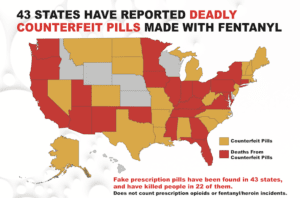Caseloads Created By The Opioid Crisis Taking A Toll On Coroners And Medical Examiners
 According to the Centers for Disease Control and Prevention, 70,237 Americans died from drug overdoses in 2017 and nearly 70% of those deaths involved an opioid. As families and friends cope with each loss, coroners and medical examiners must use forensics, medical knowledge, and good old detective skills to determine how each loved one died. As the opioid crisis marches on, the toll it is taking on these dedicated professionals mounts.
According to the Centers for Disease Control and Prevention, 70,237 Americans died from drug overdoses in 2017 and nearly 70% of those deaths involved an opioid. As families and friends cope with each loss, coroners and medical examiners must use forensics, medical knowledge, and good old detective skills to determine how each loved one died. As the opioid crisis marches on, the toll it is taking on these dedicated professionals mounts.
In a report from The Pew Charitable Trusts, Brian Peterson, president of the National Association of Medical Examiners, warned that there are only 500 trained medical examiners at work in the country at this moment in time, with a large percentage nearing retirement age. He said that many medical examiners must work overtime to keep up with the influx of cases, and in some places, they are running out of storage for bodies. “Virtually every medical examiner’s office and toxicology laboratory in the U.S. has felt the impact of the opioid tsunami,” Peterson said.
Budgets continue to rise because of the need to process so much loss of life. Pennsylvania State Coroners Association attorney Susan Shanaman said, “There’s a tremendous cost. Not only to society, through people dying, but through the cost and amount of work required to be done by the coroners – in many cases doubling, tripling budgets.” An annual report written by Shanaman stated that costs for autopsies and toxicology tests in Pennsylvania reached $30 million in 2017.
Charles “Chuck” Kiessling has been the Lycoming County, Pennsylvania coroner for 18 years, according to Penn Live. Kiessling and two deputies serve a1,244 square mile area, making distance an additional factor in their workload. Kiessling said, “On TV, they run back to the lab and within two minutes they have all this stuff done. That’s not realistic. For us, we have to drive to Allentown, so we transport bodies 144 miles each way for an autopsy.” Coroners and medical examiners do more than just rule on the cause and manner of death and transport bodies for autopsies. They also photograph scenes, collect physical evidence with law enforcement and notify the next of kin. The last item causes one of the most significant mental tolls.
Penn Live also spoke with Kenneth Bacha, the coroner for Westmoreland County in Pennsylvania, who said that the mental and emotional side of the job has “gotten crazy.” “We know these people too, some of them are friends of ours… We know their kids had a drug problem and so on,” Bacha said. “And they know, at some point, we’re going to be knocking on their door… I mean, we do identifications all the time, but how do you do it with the people that you know?”
Pennsylvania coroners are not the only ones facing these issues. CBS News reported that Rob Russell, the coroner for Kane County in Illinois, does not have enough budget to do his job and also relies on another county to hold bodies until he has room for them. Reporting from WTHR in Indianapolis, Indiana documented a coroner in that state struggling with not having enough storage for bodies. Tippecanoe County Coroner Donna Avolt stated that “Our refrigerator unit at that point only held six [bodies]. It was filled. I also had funeral homes holding bodies for me, and there were bodies at the hospitals. There were so many of them… and it was primarily drug overdoses.” According to the Niagara Gazette, county coroners and medical examiners in New York launched an awareness campaign in an effort to prevent fatal overdoses.
Despite the significant emotional challenges, coroners and medical examiners continue to provide answers to loved ones. With the opioid crisis showing no signs of slowing down, state budgets will continue to feel the impact of having to pay for all the work they must do.